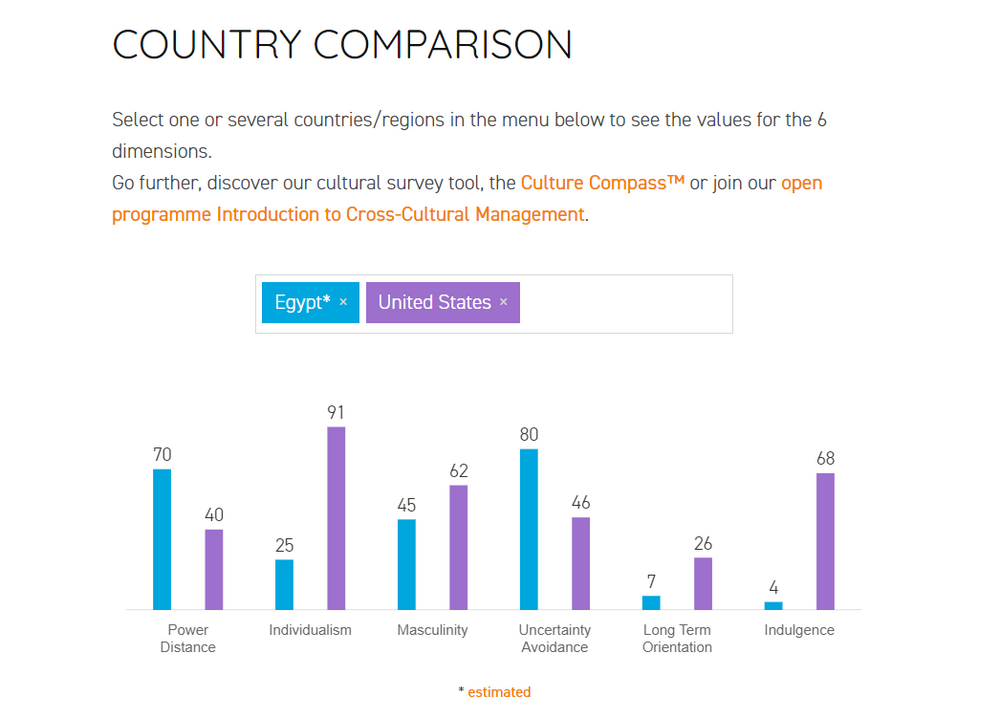Using the Hofstede Model, I compared the cultural differences between my current home country, the USA, and my original home country, Egypt. The six dimensions between Egypt and The United States have many differences, especially with indulgence, long-term orientation, and individualism.

The two most remarkable score differences noticeable on the Hofstede model are individualism and indulgence. Yes, Egypt’s high score in power distance and low score in originality resulted in a culture that supports a hierarchal, patriarchal system. Unfortunately, Egypt and its neighboring countries have been running in this manner for centuries. This type of structure supports result-only engagements with foreign-working teams. Therefore, to be a distinguished leader within this type of work environment, it is best to follow a work style where you are logical, analytical, linear, detail-oriented, and (most importantly) get results.
Individualism: Egypt scored 25, which means that each independent member is tied down within a group sector. Their traditional lifestyle allows them to intertwine with long-term commitments and relationships with other members distant from the direct family (COUNTRY COMPARISON, 2020). This is usually a double-edged sword: although it sounds lovely, the issue here would be that if a member commits particular behavior or develops different commitments that don’t follow with the original tradition, distant individuals from this sector would drag this person’s reputation to the ground (and it would stay that way for many years). This connection with other individuals is the essence of how the world revolves around them, whether it is the work cycle or even in interpersonal relationships. The USA scored 91; this means that interpersonal connections outside of work and outside the direct family do not affect this culture’s lifestyle or work cycle (COUNTRY COMPARISON, 2020). The expectation for this culture is that individuals should focus on themselves only without being affected by others. Their personal and work-life should never be intertwined with each other.
Indulgence: Egypt scores a 4 in this category, which means Egypt follows a cynical and pessimistic lifestyle (COUNTRY COMPARISON, 2020). I know that this is greatly influenced by their social norms and their focus on religion from a personal perspective. Because of this lifestyle (focusing on improving their work quality, life, and faith), they have little to no interest in indulging themselves in desires and leisure time. This does not apply to all individuals in Egypt; however, this is the expected norm for most of the population residing in Egypt. America scores 68 because of its negative attitude vs. behavior (COUNTRY COMPARISON, 2020). Their culture is identified as indulgent to their desires and has little to no control over their impulses. This is recognized in many cases, such as consuming drugs, vaping at a young age, and other types of illicit/illegal behavior vs. what the common law claims and works towards (COUNTRY COMPARISON, 2020).
To build rapport across cultures and overcome intercultural obstacles, one must master multiple communication styles, be informed of these intercultural groups, and practice numerous work styles (Brett, Behfar, & Kern, 2006) (Zander, 2015). Practicing active listening and setting clear goals and responsibilities for each individual (including oneself) will allow fewer chances for conflict and confusion within the workplace (Managing a Cross-Cultural Team? Here Are 10 Strategies To Do It Effectively!, 2019).
Most businesses in Egypt follow a hierarchical type of leadership style of work. Unfortunately, being a leader within a company in this form is quite complex, requires lots of work, connections with other individuals from higher ranks within the job itself, and time. However, what is commonly known between other individuals is mutual respect for foreigners who work in Egypt. Most business people respect foreigners who work in their businesses because they utilize their work styles and differentiation within the experiences and skills they bring to a company. However, this does not change the fact that this is how most companies operate within the country itself. To be a distinguished leader, it is best to follow a work style where you are logical, analytical, linear, detail-oriented, and get results.
For a long time, the women of Egypt have been fighting for their distinguished rights, and there has not been much feedback or response from the government. The personal insight I can provide to this is that Egypt follows a patriarchal system like many other Middle Eastern countries. Just like past-time America, women were placed as child-bearers, people put in homes to cook, clean, and well.. stay at home! All the while, men go to work, etc.
However, modern-day life requires otherwise. And while women are allowed to work, the system has not made it easier for women to hold administrative and political roles within top-tier positions in any organization nor the government—many people in the Middle East, especially Muslims, associate this lifestyle with the religion of Islam. Yes, Islam does associate women with being the best at being caregivers and mothers; however, the belief also associated women to have equal rights as to men when it came to owning and running businesses (lands and other properties, too!), mutual respect, and the signification of women’s roles within the society. Unfortunately, the system enforces this to be twisted upon toxic masculinity, so a patriarchal system overrules what the religion states and what the women request.
Toxic masculinity has overruled Middle Eastern women for centuries because of the rules that favor women’s religious positions. Most laws passed down within the culture and tradition of Middle Easterns have not been mentioned nor are associated with the religions of these countries (Christianity, Judaism, and Islam).
References
Brett, J., Behfar, K., & Kern, M. (2006, November). Managing Multicultural Teams. Retrieved from Harvard Business Review: https://hbr.org/2006/11/managing-multicultural-teams
COUNTRY COMPARISON. (2020). Retrieved from Hofstede Insights: https://www.hofstede-insights.com/country-comparison/egypt,the-usa/
Managing a Cross-Cultural Team? Here Are 10 Strategies To Do It Effectively! (2019, October 30). Retrieved from AllThingsTalent: https://allthingstalent.org/2019/10/30/managing-cross-cultural-team/
Zander, M. (2015). 7 tips for optimizing international business communication. Retrieved from 99designs: https://99designs.com/blog/tips/tips-for-optimizing-international-business-communication/

